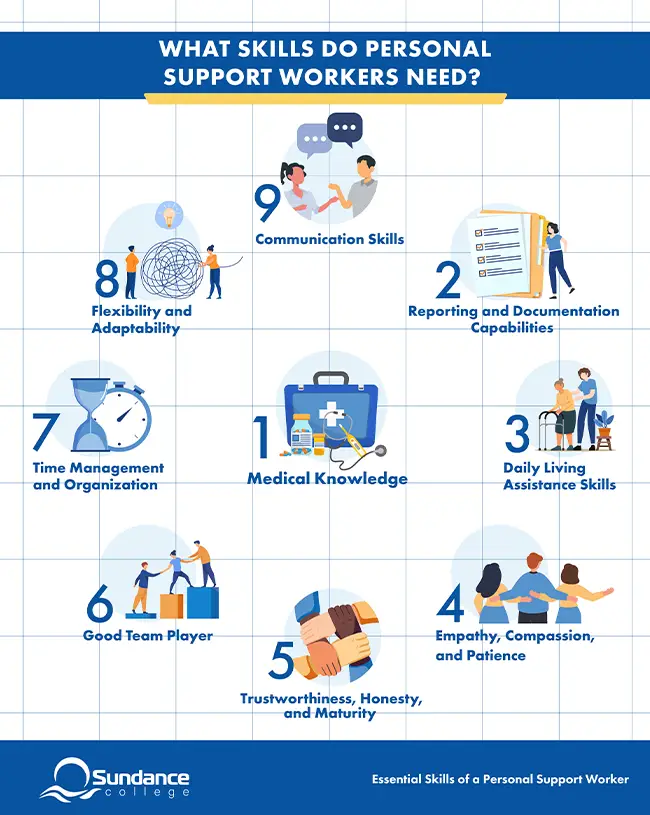Blog / Essential Skills of a Personal Support Worker
Categories
Table of Contents
Personal support workers (PSWs) like healthcare assistants, personal care aides, and other caregivers play a vital role in the healthcare system. They provide essential care and support to those who need it most, including the elderly, chronically ill, and injured. To excel in this role, PSWs require a diverse set of skills, knowledge, and traits that go beyond basic caregiving.
From medication knowledge to communication skills, empathy to adaptability, each skill is crucial to ensure the healthcare team runs smoothly and patients receive the best care possible for their physical, mental, and social wellbeing. A career as a personal support worker can be incredibly fulfilling when the right skills are developed to support patients.
These skills required are crucial for PSWs to undergo their daily duties, which include:
- Aiding with mobility exercises
- Administering medications as prescribed
- Collaborating with healthcare professionals on care plans
- Providing emotional support for clients and their families
- Light housekeeping tasks
We’re going to go into each essential skill a PSW needs and let you know how you can develop these skills to start your career in healthcare with your best foot forward. Read on or listen to our podcast below…
Listen to: “Essential Skills of a Personal Support Worker”
Medical Knowledge
A big part of the role of a personal support worker requires fundamental medical knowledge. In their daily interactions with patients or clients, PSWs frequently encounter a range of medical conditions, both physical and mental. Understanding these conditions, as well as how to use the equipment needed and follow the correct safety protocols, is essential to provide the appropriate care and support.
Knowledge Of Common Physical And Mental Health Conditions
One crucial aspect of medical knowledge that PSWs is familiarity with body systems and common physical conditions. This includes diabetes, arthritis, hypertension, and heart disease, which can be common among individuals who are elderly, disabled, or ill.
The care PSWs provide goes beyond physical assistance. They provide well-rounded, comprehensive support, including emotional and social care, for their patients to help them live an independent and fulfilling life. This means that personal support workers need to have a good understanding of common cognitive and mental health issues that patients could present.
Common mental and cognitive issues a PSW may encounter include depression, anxiety, and dementia. A personal support worker must not only be equipped to support clients facing these issues but be able to recognize the symptoms and signs that present themselves as these conditions emerge and progress.
Knowledge Of Mobility Equipment
To support their patients physically, PSWs will need to be able to use mobility aides and equipment. Equipment can include wheelchairs, walkers, and canes, as well as stairlifts, ceiling lifts, and hospital or homecare beds.
Possessing the knowledge of how to use this equipment means that a personal support worker can assist their clients in their day-to-day movements and activities and help them to live an independent life.
Knowledge Of First Aid And Safety Procedures
When working with elderly, ill, or disabled individuals, it’s essential that a PSW has a solid understanding of First Aid and other safety procedures. Personal support workers are often the people who spend the most time with those they care for, so they need to be able to identify and assist clients in emergency situations. This includes being able to perform CPR, administer basic first aid, and respond to falls or choking hazards.
Knowledge Of Patient Medical History
Personalization is the key to providing patients with the best support.
By being familiar with a client’s medical history, including their ailments, allergies, and capabilities – and the interplay of multiple conditions – a PSW can work with their team to create and implement a personal care plan and provide the support needed.
This also means that maintaining accurate and up-to-date records is crucial for the healthcare team.
Reporting and Documentation Capabilities
Working as part of a professional healthcare team, a personal support worker provides doctors, therapists, and other relevant specialists with information on the patient’s condition, preferences, and well-being. This comes in the form of reports and documents that share updates about patient vitals and medication records.
To successfully document information about the patient, a PSW must have very keen health monitoring abilities, active listening skills, and a detail-oriented approach to their reports.
The relevant information shared helps the rest of the team adjust their patient treatment and provide patients with the most appropriate support.
Daily Living Assistance Skills
Personal support workers are responsible for providing daily living assistance to patients. This means they could be driving clients to appointments, picking up groceries, managing medication and meals, and assisting with personal hygiene.
To provide this kind of essential assistance, there are a couple of crucial skills a PSW needs:
Nutrition And Medication Knowledge
Nutrition and medication are two of the most impactful factors for patient treatment and recovery. Good nutritional knowledge, including knowing what to eat, when to eat, and how much to eat is essential for a PSW to provide the best patient care.
Knowing the right type, amount, and time to consume medicine is just as critical. While medication is directed by physicians, keeping a tracking system, and using patient records for reference can help PSWs ensure their clients receive their treatment as needed.
Good Physical Fitness
A good level of fitness is required for PSW to be successful in their role. It’s an active career that involves lifting, supporting patients with mobility issues, and being on your feet for long periods of time. Because of this, personal support workers should generally be able to lift objects to 25 pounds, bend and kneel frequently without pain, and walk up and down stairs easily.
Communication Skills
Being a good communicator is the most important interpersonal skill to hone as a personal support worker. They need to be effective with listening, speaking, and writing to clearly convey information to others and interpret any information received.
Effective and compassionate communication skills not only allow PSWs to interact with their healthcare team and keep it running smoothly, but it means they can pass on relevant and supportive information to clients and their families.
Empathy, Compassion, and Patience
An excellent personal support worker strives to take care of a patient’s overall wellbeing, including their emotional, mental, and social needs. Empathy, compassion, and patience are some key characteristics that allow PSWs to provide this support.
Like anyone, patients can have challenging and difficult days, and personal support workers need to be prepared to lend a listening ear and provide the comfort their patients need to feel supported and looked after.
Trustworthiness, Honesty, and Maturity
The patients that personal support workers care for are often the most vulnerable members of our society. PSWs are trusted to enter clients’ homes, listen to their needs, get to know them on a personal level, and support them in their hour of need.
For clients and their families, it takes a great deal of trust to allow this to happen, so a personal support worker needs to be trustworthy, honest, and mature in their approach. Possessing these skills means that PSWs can support their clients with their needs while treating them with respect and dignity.
Good Team Player
Behind every patient is a team of healthcare professionals, including personal support workers. Team collaboration in caregiving provides the best possible care to the patient.
The healthcare team often work together to provide a care plan for each patient, outlining the specific needs, special requirements, mobility and nutritional needs, therapeutic exercises, and any cognitive physiological issues. A personal support worker must be able to follow instructions and provide feedback to the rest of the team via records and documentation, as well as listening and other communication.
Time Management and Organization

One of the most important skills to demonstrate as a personal support worker is time management. This skill is a key indicator of discipline, responsibility, and engagement. Regardless of how early or late your shift is, being on time demonstrates to patients and the healthcare team trustworthiness and professionalism, which goes a long way in building a great relationship between PSWs and clients, as well as career advancement.
Effective time management also means handling different tasks under time constraints. Whether attending to multiple clients in a day or dedicating focused care to a single individual, a PSW must ensure each client receives comprehensive support. This includes addressing their physical and emotional needs, ensuring every person feels fully supported and cared for, regardless of the number of clients on the PSW’s schedule.
Flexibility and Adaptability
A personal support worker’s dynamic environment requires them to become quick-thinking problem solvers. They need to use analytical skills such as critical thinking and logical reasoning to address everyday challenges including time constraints, communication barriers, and accessibility issues.
Being flexible and adaptable is key for helping patients who require last-minute support, and being there for team members who may need a shift covered or extra help.

How Can You Gain the Skills Needed to Become a PSW?
Now that you know the important caregiving competencies of a personal support worker, you may be wondering how you can develop them.
With Sundance College’s Personal Support Worker diploma program, you can develop these essential skills in less than a year. With a blend of theoretical knowledge, hands-on training in our campus labs as well as your practicum experience, our diploma program is your gateway to acquiring essential competencies that prepare you to make a meaningful impact in the field of care.
Our program includes courses that will help build the foundational knowledge you need to become a successful personal support worker. Courses such as:
- Care Planning
- Safety and Mobility
- Assisting with Medications
- Cognitive and Mental Health Issues
- And more
Our program also has a 7-week practicum which will allow you to implement the theory-based knowledge you’ve learned. This will help deepen your understanding of what it takes to become a successful PSW in a real-world setting.
Read our career overview of a personal support worker to learn more about this role and reach out to one of our academic advisors to learn more about how you can start your journey.

